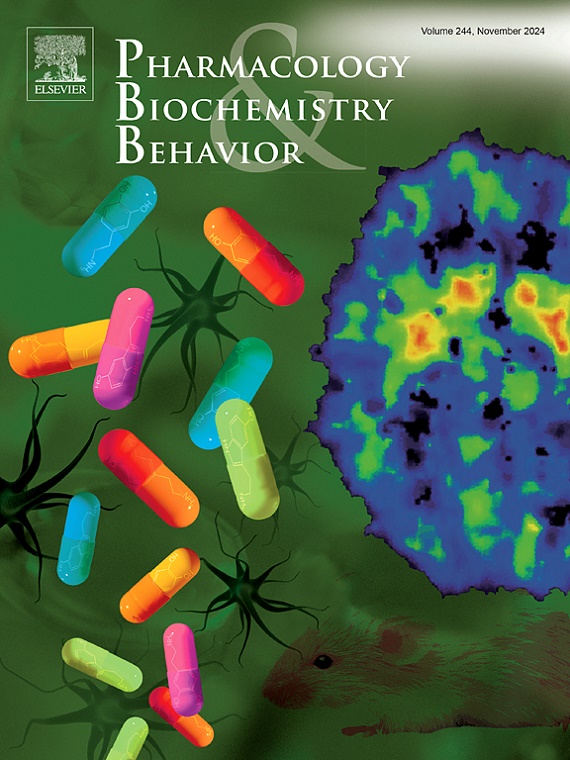复制和扩展与可卡因渴求潜伏期相关的伏隔核内谷氨酸相关变化的亚区选择性。
IF 3.3
3区 心理学
Q1 BEHAVIORAL SCIENCES
引用次数: 0
摘要
在戒毒期间,随着时间的推移,线索诱发的觅药行为会加剧,而这种 "可卡因渴求的潜伏期 "涉及到伏隔核(NA)谷氨酸传递的改变。在此,我们采用体内微透析和免疫印迹相结合的方法,进一步研究了雄性大鼠在静脉注射可卡因(0.25 毫克/次)6 小时、为期 10 天的 "可卡因渴望潜伏期 "中,NA 亚区域内谷氨酸传递的生化指标发生的变化。对核心亚区(NAc core)全细胞裂解液的免疫印迹显示,可卡因自我给药史、戒断和药物线索再暴露对 Homer2a/b、mGlu1 和 GluN2b 的表达以及 Akt 和 ERK 活性指数之间存在相互作用。除了PKCε磷酸化外,外壳亚区(NAc外壳)内大多数蛋白质的变化取决于药物线索的再次暴露和可卡因的历史,而不是以一致的时间依赖性方式变化。在长期(30 天)的戒断过程中,只有在可卡因经验大鼠的 NAc 核心区,细胞外谷氨酸的基础含量才会明显减少,同时 mGlu1/5 激动剂 DHPG 在该亚区内提高谷氨酸水平的能力也会明显减弱。最后,在长期可卡因戒断期间,在NAc核心区过度表达Homer1c或Homer2b都不会改变线索诱发反应的程度、其消退或可卡因刺激的觅药行为的恢复。本研究结果与现有文献一致,即 NAc 核心亚区内 1 组 mGlu 受体功能的变化是诱发可卡因渴求的核心原因,并进一步证明了 Homer 蛋白在诱发诱导可卡因渴求中的重要作用。此外,我们的研究结果还提供了新的相关证据,表明NAc核心区内Akt活性的升高和ERK活性的减弱是导致孵育期可卡因渴求表现的潜在因素,值得今后进行研究。本文章由计算机程序翻译,如有差异,请以英文原文为准。
Replication and extension of the subregion selectivity of glutamate-related changes within the nucleus accumbens associated with the incubation of cocaine-craving
Cue-elicited drug-seeking behavior intensifies with the passage of time during withdrawal from drug taking and this “incubation of cocaine-craving” involves alterations in nucleus accumbens (NA) glutamate transmission. Here, we employed a combination of in vivo microdialysis and immunoblotting approaches to further examine changes in biochemical indices of glutamate transmission within NA subregions that accompany the incubation of cocaine-craving exhibited by male rats with a 10-day history of 6-h access to intravenous cocaine (0.25 mg/infusion). Immunoblotting on whole cell lysates from the core subregion (NAc core) revealed interactions between cocaine self-administration history, withdrawal and drug cue re-exposure for Homer2a/b, mGlu1, and GluN2b expression, as well as indices of Akt and ERK activity. With the exception of PKCε phosphorylation, most protein changes within the shell subregion (NAc shell) depended on drug cue re-exposure and cocaine history rather than varying in a consistent time-dependent manner. Reduced basal extracellular glutamate content was apparent only in the NAc core of cocaine-experienced rats during protracted (30 days) withdrawal and this was accompanied by a markedly blunted capacity of the mGlu1/5 agonist DHPG to elevate glutamate levels within this subregion. Finally, over-expressing neither Homer1c nor Homer2b within the NAc core during protracted cocaine withdrawal altered the magnitude of cue-elicited responding, its extinction or cocaine-primed reinstatement of drug-seeking behavior. The present findings are consistent with the extant literature implicating changes in Group 1 mGlu receptor function within the NAc core subregion as central to incubated cocaine-craving and provide further evidence against a major role for Homer proteins in gating incubated cocaine-craving. Further, our results provide novel correlational evidence implicating elevated Akt and blunted ERK activity within the NAc core as potential contributors to the expression of incubated cocaine-craving, worthy of future investigation.
求助全文
通过发布文献求助,成功后即可免费获取论文全文。
去求助
来源期刊
CiteScore
6.40
自引率
2.80%
发文量
122
审稿时长
38 days
期刊介绍:
Pharmacology Biochemistry & Behavior publishes original reports in the areas of pharmacology and biochemistry in which the primary emphasis and theoretical context are behavioral. Contributions may involve clinical, preclinical, or basic research. Purely biochemical or toxicology studies will not be published. Papers describing the behavioral effects of novel drugs in models of psychiatric, neurological and cognitive disorders, and central pain must include a positive control unless the paper is on a disease where such a drug is not available yet. Papers focusing on physiological processes (e.g., peripheral pain mechanisms, body temperature regulation, seizure activity) are not accepted as we would like to retain the focus of Pharmacology Biochemistry & Behavior on behavior and its interaction with the biochemistry and neurochemistry of the central nervous system. Papers describing the effects of plant materials are generally not considered, unless the active ingredients are studied, the extraction method is well described, the doses tested are known, and clear and definite experimental evidence on the mechanism of action of the active ingredients is provided.

 求助内容:
求助内容: 应助结果提醒方式:
应助结果提醒方式:


